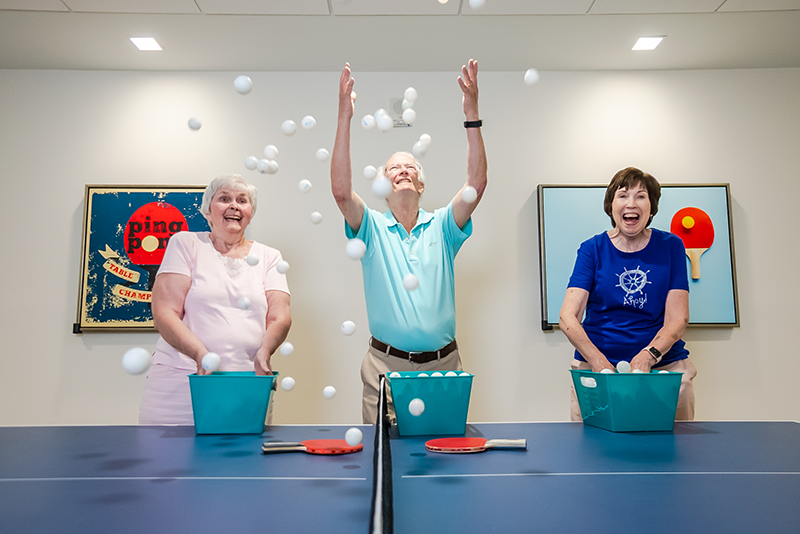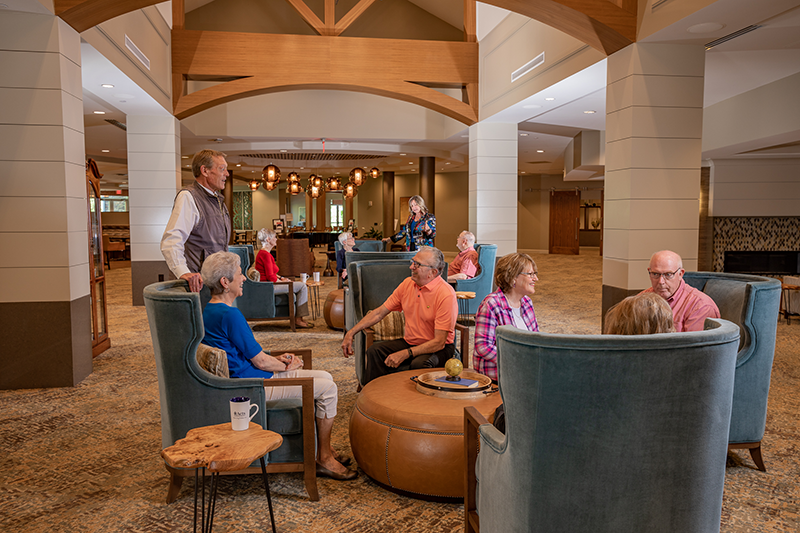What Independent Senior Living Options are There?
Family members of and beyond retirement age have many different independent senior living options when it comes to living arrangements. Some of these options may be better than others.
Sometimes, for example, it’s not possible for a senior family member like an elderly parent to live in their existing home, or even move in with younger family members. In situations like these, there are many alternatives in the form of retirement facilities.
There are, of course, many different types of retirement communities, each of which provides different levels of care for its residents. A senior independent living community is, for example, a style of retirement living that differs from an assisted living community or a skilled nursing facility. Here’s what you should know about these differences and how to pick the one that’s the best fit for your elderly loved one.

What is an Independent Living Facility for Seniors?
Independent living is a housing facility that features amenities and services seniors may need as they age. Some common amenities that can be found in an independent living community include:
- landscaped outdoor spaces like walking trails, picnic areas, and gardening spaces
- fitness centers with exercise equipment, physical trainers, and fitness classes
- indoor or outdoor swimming pools
- fully-equipped art studios and carpentry workshops with qualified instructors
- game and billiards rooms for socializing with fellow residents
- libraries and reading rooms
- computer rooms for browsing the internet and sending emails to loved ones
- performance spaces for attending concerts
- on-site fine and casual dining
- non-denominational chapels with chaplain services
- rides to and from local doctor appointments
- organized day and weekend trips to local attractions like museums or shopping
Many active, healthy retirees choose independent living, as it provides them with peace of mind knowing additional services are available as they age.
Most independent living communities are sprawling, resort-like retirement campuses that offer a wide array of amenities for their residents to enjoy. Near countless opportunities abound for socializing, enjoying hobbies both indoors and out, and accessing nearby points of interest.
In many instances, residence at an independent living community can often feel like being on permanent vacation, sort of like a cruise without the water.
Independent Senior Living Options
55+ Communities
Senior-only neighborhoods often referred to as 55+ communities are environments consisting mostly of single-family homes, townhomes, or condos, where you must be over 55 years of age to live.
HOA fees typically cover amenities such as lawn care and snow removal, a community pool, and a clubhouse with fitness equipment. The opportunity to live independently among peers in a vibrant, activity-rich environment is one of the biggest benefits of choosing such a neighborhood.
Senior Apartments
Senior apartments offer an affordable and low-maintenance housing option for elderly individuals who seek independence but prefer not to deal with the responsibilities of homeownership. These apartment complexes are exclusively for seniors and are often conveniently located near shopping centers, parks, and medical facilities. Units are designed with accessibility in mind, featuring modifications like wide doorways, walk-in showers, and emergency call systems to ensure safety.
Residents benefit from common areas for social activities, on-site laundry facilities, transportation services to local destinations, and basic housekeeping and maintenance. Senior apartments offer a straightforward, budget-friendly lifestyle that fosters independence while promoting a sense of community through shared spaces and scheduled events.
Continuing Care Retirement Communities (CCRCs)
Continuing Care Retirement Communities, commonly known as CCRCs, provide a long-term living solution for seniors who want the reassurance of a full continuum of care. Residents start with independent living accommodations in a gated retirement community similar to the options identified above. However, and, should they or their spouse’s health needs ever change, they can transition to assisted living or skilled nursing care without leaving the community or facing an direct increase in monthly costs (depending on the type of care plan selected).
CCRCs offer apartments, cottages, or villas for independent residents, along with a range of services that include dining, housekeeping, lawn care and maintenance services, and access to on-site healthcare and emergency medical support. Residents enjoy a wide range of activities and programs, all designed to enhance quality of life. This model of care offers seniors and their families peace of mind, knowing that healthcare support will always be available if needed without the disruption of a major move.
Co-Housing for Seniors
Co-housing for seniors is a unique concept that emphasizes collaboration and community. In these living arrangements, residents maintain private living spaces but share communal areas such as kitchens, gardens, and recreation spaces. Co-housing communities are typically self-managed, with residents participating in community governance and decision-making.
Shared amenities often include dining and kitchen facilities, common living rooms, and recreation areas, as well as organized activities such as gardening groups, fitness sessions, and book clubs. Residents share responsibilities for the upkeep of common areas and contribute to a strong sense of community and mutual support.
How to Choose an Independent Living Facility
Choosing the right independent living facility means finding a place that matches a senior’s lifestyle, budget, and future healthcare needs. The best facility should offer a safe, comfortable environment with the right mix of services, amenities, and opportunities for social engagement.
To start, location is crucial. Many families look for communities near loved ones, familiar neighborhoods, or excellent healthcare services. Budget should be a major consideration as well, since costs can vary widely based on entrance fees, monthly rents, and additional service charges.
When comparing options, be sure to consider:
- Location: Close to family, healthcare, or preferred areas.
- Cost: Understand entrance fees, rent, and extra service costs.
- Services and Amenities: Dining, fitness centers, transportation, housekeeping, and activities.
- Healthcare Access: Ability to transition to higher levels of care if necessary, and at what increase of costs.
- Community Culture: Resident engagement, atmosphere, and activities.
- Accessibility Features: Safety upgrades like grab bars, elevators, and emergency call systems.
Visiting potential communities, speaking with residents, and attending events are great ways to get a feel for the environment. Taking the time to match a community to a senior’s current and future needs ensures they will feel secure, supported, and happy in their new home.
Is Independent Living Right for Your Elderly Loved One?
Remember that beyond independent living there are other care facilities for elderly people that may be more appropriate. Finding the right type of senior care for your elderly loved one can be a challenging task. Not every family has the capabilities of providing that care themselves; modern life often precludes us from seeing to the needs of an elderly parent, for example, as we struggle to meet our own needs and those of younger family members.
In many situations, an independent living community can be an excellent choice for an elderly loved one. If your older parent is otherwise healthy and in good physical condition, an independent living community could be something they would enjoy. It gives them opportunities to make new friends in similar situations, socialize much more frequently, and remain both physically and mentally active.
If your elderly loved one is struggling with certain health issues, however, or could benefit from assistance with daily activities such as washing dishes or showering, independent living may not be the best option. Seniors who have more advanced needs such as moderate to severe mobility challenges, cognitive issues, or require help staying on top of medications may be better suited to a retirement option that offers more organized assistance overseen by professionals in the elder care community, such as an assisted living facility.
Related content: Learn about the various contract types available at a CCRC.
Making the Right Choice for Independent Living
There are a wide range of independent senior living options that cater to different needs, lifestyles, and budgets. Whether it’s a 55+ community, a senior apartment, a CCRC, or a co-housing arrangement, each facility type offers its own blend of amenities, services, and social opportunities.
When choosing the right location, it’s crucial to tour several communities, ask questions, and involve loved ones in the decision-making process. Matching the facility to both current needs and potential future care requirements ensures peace of mind for both seniors and their families.
Acts Retirement-Life Communities, for example, offers luxury CCRCs that blend high-end amenities with the reassurance of advanced healthcare services as needed, providing a premier solution for those looking for an exceptional independent living experience.
Deciding what is the best independent living environment for an elderly loved one can be a difficult, stressful process. Please feel free to review our numerous resources as you navigate this journey.





